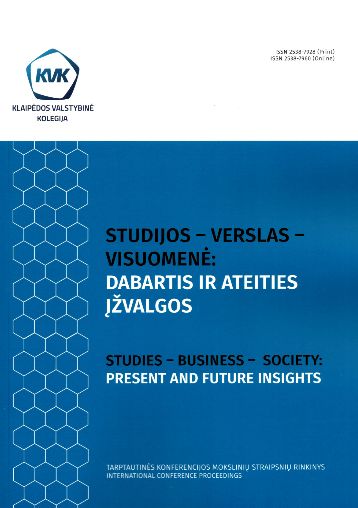SOCIAL INTERACTIONS IN DISTANCE TEACHING/LEARNING PROCESS OF MATHEMATICS
DOI:
https://doi.org/10.52320/svv.v1iVII.234Keywords:
distance teaching/learning process of mathematics, social interaction, digital technologiesAbstract
The processes of globalization all over the world are placing diverse demands on the education system. Information technology is changing all areas of life, both in work activities and the learning environment. At the same time, social interactions are also experiencing changes. Therefore, new opportunities are becoming new values. Finding themselves not only in the position of a teacher but as well in the one of a learner’s makes modern educators face a great variety of challenges. Since the student is a person who has already been a kind of technology user since childhood, while the teacher has to acquire skills to use and apply technologies in the study process. Moreover, the global pandemic caused by the virus COVID-19 has had a significant impact on educational changes, when, with the help of digital technologies, the teaching/learning process of mathematics has been transferred to a virtual environment in order to maintain, as well as create and develop social interactions as a medium for sharing knowledge and experiences.
Problem question - how do social interactions work in the distance teaching/learning process of mathematics?
The object of the research is social interactions in distance teaching/learning process of mathematics.
The purpose of the research is to reveal the possibilities of the development of social interactions in distance teaching/learning of mathematics.
The tasks:
- To discuss the problems of the distance teaching/learning process of mathematics.
- After evaluating the students’ reflective experiences, reveal the possibilities of development of social interactions in distance teaching/learning process of mathematics.
Method of the research. A qualitative research strategy and method was chosen for the research - qualitative content analysis, which allows to explore the contents of text documents, i.e. when coding data, identify typical patterns and formulate topics related to the problematic question of the research. The research was carried out based on the constructivist paradigm: by analysing students’ experiences of distance learning of mathematics, the aim is to reveal the functioning characteristics of social interactions. The research was conducted in 2020-2022, the informants were Kaunas University of Applied Sciences first-year students studying social sciences. Students submitted reflections describing their experience of learning mathematics remotely. The research is based on ethical and moral principles, ensuring personal privacy, confidentiality, and anonymity.
The informants’ reflections testify that students who had not found mathematics as a complex subject while studying at comprehensive school, did not experience any difficulties while studying at college. The opposite experience of the informants, for whom learning mathematics had been problematic at comprehensive school, experienced difficulties while studying the subject at college; learning required a lot of time and effort. The conducted study of reflective experiences revealed that digital technologies allow to create and enable the development of social interaction relationships in distance learning of mathematics. Social interactions take place in many directions: between students, including teachers, and, where appropriate, between students and outsiders. Mathematical abilities developed during the study process allow the successful completion of tasks and, in a sense, give students an advantage in choosing whether to share their knowledge and experience or work individually. The importance of community was also highlighted – students with weak mathematical abilities can take a prominent position in independent work in a group, they mediate and coordinate the task performance process, thus strengthening other personal abilities and deepening mathematical knowledge and improving their application practice. Social interaction, as a network of interpersonal connections, is significant both for the individual and for the communal group, in this case – the medium of teaching/learning of mathematics – in terms of the connections that are created and developed.
Keywords: distance teaching/learning process of mathematics; social interaction; digital technologies.
Downloads
Published
How to Cite
Issue
Section
License
Copyright (c) 2022 Ilvija Pikturnaitė; Zita Baužienė

This work is licensed under a Creative Commons Attribution 4.0 International License.
Individual articles are published Open Access under the Creative Commons Licence CC-BY 4.0, which permits unrestricted use, distribution, and reproduction in any medium, provided the original author and source are credited. Authors retain copyright in their articles, but grant Klaipėdos valstybinė kolegija the right of the first publication.

